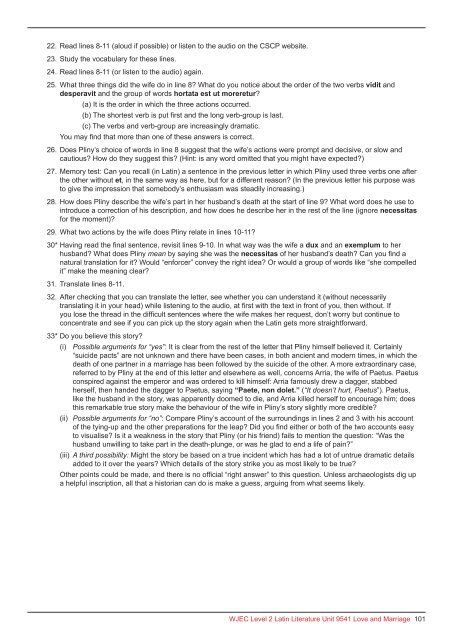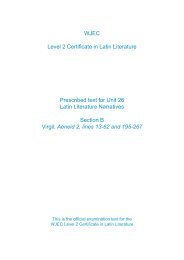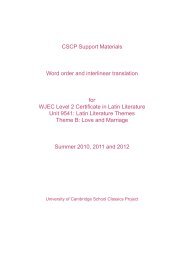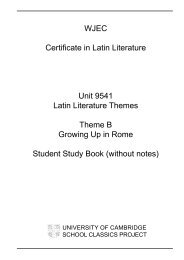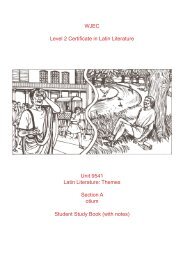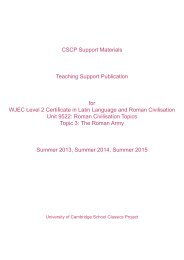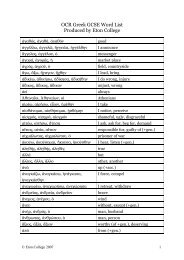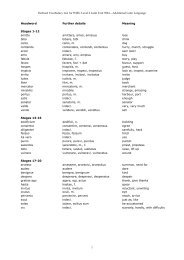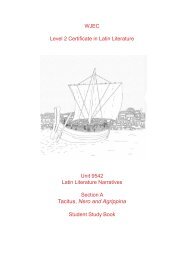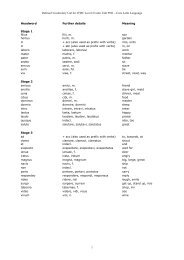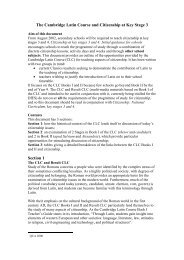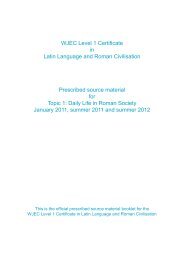2. Student Study Book - Cambridge School Classics Project
2. Student Study Book - Cambridge School Classics Project
2. Student Study Book - Cambridge School Classics Project
Create successful ePaper yourself
Turn your PDF publications into a flip-book with our unique Google optimized e-Paper software.
2<strong>2.</strong> Read lines 8-11 (aloud if possible) or listen to the audio on the CSCP website.23. <strong>Study</strong> the vocabulary for these lines.24. Read lines 8-11 (or listen to the audio) again.25. What three things did the wife do in line 8? What do you notice about the order of the two verbs vidit anddesperavit and the group of words hortata est ut moreretur?(a) It is the order in which the three actions occurred.(b) The shortest verb is put first and the long verb-group is last.(c) The verbs and verb-group are increasingly dramatic.You may find that more than one of these answers is correct.26. Does Pliny’s choice of words in line 8 suggest that the wife’s actions were prompt and decisive, or slow andcautious? How do they suggest this? (Hint: is any word omitted that you might have expected?)27. Memory test: Can you recall (in Latin) a sentence in the previous letter in which Pliny used three verbs one afterthe other without et, in the same way as here, but for a different reason? (In the previous letter his purpose wasto give the impression that somebody’s enthusiasm was steadily increasing.)28. How does Pliny describe the wife’s part in her husband’s death at the start of line 9? What word does he use tointroduce a correction of his description, and how does he describe her in the rest of the line (ignore necessitasfor the moment)?29. What two actions by the wife does Pliny relate in lines 10-11?30* Having read the final sentence, revisit lines 9-10. In what way was the wife a dux and an exemplum to herhusband? What does Pliny mean by saying she was the necessitas of her husband’s death? Can you find anatural translation for it? Would “enforcer” convey the right idea? Or would a group of words like “she compelledit” make the meaning clear?31. Translate lines 8-11.3<strong>2.</strong> After checking that you can translate the letter, see whether you can understand it (without necessarilytranslating it in your head) while listening to the audio, at first with the text in front of you, then without. Ifyou lose the thread in the difficult sentences where the wife makes her request, don’t worry but continue toconcentrate and see if you can pick up the story again when the Latin gets more straightforward.33* Do you believe this story?(i) Possible arguments for “yes”: It is clear from the rest of the letter that Pliny himself believed it. Certainly“suicide pacts” are not unknown and there have been cases, in both ancient and modern times, in which thedeath of one partner in a marriage has been followed by the suicide of the other. A more extraordinary case,referred to by Pliny at the end of this letter and elsewhere as well, concerns Arria, the wife of Paetus. Paetusconspired against the emperor and was ordered to kill himself: Arria famously drew a dagger, stabbedherself, then handed the dagger to Paetus, saying “Paete, non dolet.” (“It doesn’t hurt, Paetus”). Paetus,like the husband in the story, was apparently doomed to die, and Arria killed herself to encourage him; doesthis remarkable true story make the behaviour of the wife in Pliny’s story slightly more credible?(ii) Possible arguments for “no”: Compare Pliny’s account of the surroundings in lines 2 and 3 with his accountof the tying-up and the other preparations for the leap? Did you find either or both of the two accounts easyto visualise? Is it a weakness in the story that Pliny (or his friend) fails to mention the question: “Was thehusband unwilling to take part in the death-plunge, or was he glad to end a life of pain?”(iii) A third possibility: Might the story be based on a true incident which has had a lot of untrue dramatic detailsadded to it over the years? Which details of the story strike you as most likely to be true?Other points could be made, and there is no official “right answer” to this question. Unless archaeologists dig upa helpful inscription, all that a historian can do is make a guess, arguing from what seems likely.WJEC Level 2 Latin Literature Unit 9541 Love and Marriage 101


